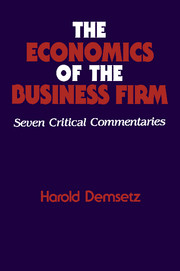Book contents
- Frontmatter
- Contents
- Preface
- First commentary: The firm of theory: its definition and existence
- Second commentary: Agency and nonagency explanations of the firm's organization
- Third commentary: Enterprise control, wealth, and economic development
- Fourth commentary: Profit maximization and rational behavior
- Fifth commentary: The use and abuse of accounting profit data
- Sixth commentary: Management compensation and tournament theory
- Seventh commentary: The intensity and dimensionality of competition
- References
- Index
Third commentary: Enterprise control, wealth, and economic development
Published online by Cambridge University Press: 06 July 2010
- Frontmatter
- Contents
- Preface
- First commentary: The firm of theory: its definition and existence
- Second commentary: Agency and nonagency explanations of the firm's organization
- Third commentary: Enterprise control, wealth, and economic development
- Fourth commentary: Profit maximization and rational behavior
- Fifth commentary: The use and abuse of accounting profit data
- Sixth commentary: Management compensation and tournament theory
- Seventh commentary: The intensity and dimensionality of competition
- References
- Index
Summary
The control problem discussed in the second commentary has implications far beyond those that concern the firm itself. This is not generally appreciated, and the purpose of this commentary is to show the importance of this problem to broader social issues. The issues discussed here bear on questions of economic development, regulation, and the distribution of wealth. The connection of these to the firm's agency problem is lodged in the production function.
As long as societies differ in the principles of organization (e.g., socialist vs. capitalist) and in the wealth distribution on which they rely, they will not face the same production possibility frontier. This is so even if they have identical resources and technical knowledge. If the old Soviet Union could be endowed with the resource and knowledge base available to the United States, it still would not, and could not, turn out the same mixes of outputs if it were to rely on socialist techniques of management and preferences for an egalitarian distribution of wealth. The formalist will complain that wealth distribution, culture, institutions, and organizing principles must be counted as inputs if differences in output mixes persist. And this is precisely my claim. To be the equivalent of the United States, the Soviet Union would need to be the United States. My point simply is that development theory has at best paid lip service to the importance of wealth distribution and of organizing institutions when discussing the production possibility frontier. Only now, as East Europe tries to change, has the importance of these considerations become apparent. Their importance may very well exceed that of the variables stressed in neoclassical development theory – resource endowments and technology.
- Type
- Chapter
- Information
- The Economics of the Business FirmSeven Critical Commentaries, pp. 40 - 60Publisher: Cambridge University PressPrint publication year: 1995



